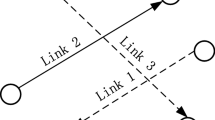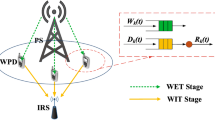Abstract
With the wide deployment of mobile network, it’s very important to utilize mobile networks resource efficiently and decrease energy consumption of wireless terminals for constructing green mobile computing. This paper mainly studies minimization problem of energy consumption in data transmission under the given data generation rate and transmission delay demand in wireless links. Firstly, a finite horizon optimal stopping problem with transmission data quantity constraint and energy consumption minimization is constructed, and then we prove the existence of optimal stopping rule and offer the solutions and processes. At last, we obtain the optimal transmission rate threshold of the sending terminal for each channel detection slot time, so as to form the optimization strategy of energy consumption for data transmission based on optimal stopping theory. The simulation results show that the strategy proposed by this paper has lower average energy consumption and higher average delivery success ratio than other strategies, and achieves better optimization effect in energy consumption.
Access this chapter
Tax calculation will be finalised at checkout
Purchases are for personal use only
Similar content being viewed by others
References
Lin, C., Tian, Y., Yao, M.: Green network and green evaluation: mechanism, modeling and evaluation. Chin. J. Comput. 34(4), 593–612 (2011). (in Chinese)
Asadi, A., Mancuso, V.: A survey on opportunistic scheduling in wireless communications. IEEE Commun. Surv. Tutorials 15(4), 1671–1688 (2013)
Garcia-Saavedra, A., Serrano, P., Banchs, A.: Energy-efficient optimization for distributed opportunistic scheduling. IEEE Commun. Lett. 18(6), 1083–1086 (2014)
Poulakis, M.I., Panagopoulos, A.D., Constantinou, P.: Channel-aware opportunistic transmission scheduling for energy-efficient wireless links. IEEE Trans. Veh. Technol. 62(1), 192–204 (2013)
Yan, Z.-J., Zhang, Z., Jiang, H., et al.: Optimal traffic scheduling in vehicular delay tolerant networks. IEEE Commun. Lett. 16(1), 50–53 (2012)
Huang, L.-J., Jiang, H., Zhang, Z., et al.: Optimal traffic scheduling between roadside units in vehicular delay tolerant networks. IEEE Trans. Veh. Technol. 64(3), 1079–1094 (2015)
Amin, O., Lampe, L.: Opportunistic Energy Efficient Cooperative Communication. IEEE Wirel. Commun. Lett. 1(5), 412–415 (2012)
Zuo, J., Dong, C., Nguyen, H.V., et al.: Cross-layer aided energy-efficient opportunistic routing in ad hoc networks. IEEE Trans. Commun. 62(2), 522–535 (2014)
Wang, G., Peng, Y., Feng, P., et al.: An energy consumption minimization routing scheme based on rate adaptation with QoS guarantee for the mobile environment. Comput. Netw. 74, 48–57 (2014). doi:10.1016/j.comnet.2014.09.006
Chen, H., Baras, J.S.: Distributed opportunistic scheduling for wireless ad-hoc networks with block-fading model. IEEE J. Sel. Areas Commun. 31(11), 2324–2337 (2013)
HayKin, S., Tie-Cheng, S., Ping-Ping, X., et al.: Communication System, 4. Publishing House of Electronics Industry, Beijing (2012). (in Chinese)
Ferguson, T.S.: Optimal Stopping and Applications, http://www.math.ucla.edu/~tom/Stopping/Contents.html. 2006
Acknowledgments
This research is supported in part by the National Natural Science Foundation of China under Grant Nos. 61562006, 61262003, in part by the Natural Science Foundation of Guangxi Province under Grant No.2010GXNSFC013013.
Author information
Authors and Affiliations
Corresponding author
Editor information
Editors and Affiliations
Rights and permissions
Copyright information
© 2015 Springer International Publishing Switzerland
About this paper
Cite this paper
Peng, Y., Wang, N., Wang, G. (2015). An Optimization Strategy of Energy Consumption for Data Transmission Based on Optimal Stopping Theory in Mobile Networks. In: Wang, G., Zomaya, A., Martinez, G., Li, K. (eds) Algorithms and Architectures for Parallel Processing. ICA3PP 2015. Lecture Notes in Computer Science(), vol 9531. Springer, Cham. https://doi.org/10.1007/978-3-319-27140-8_20
Download citation
DOI: https://doi.org/10.1007/978-3-319-27140-8_20
Published:
Publisher Name: Springer, Cham
Print ISBN: 978-3-319-27139-2
Online ISBN: 978-3-319-27140-8
eBook Packages: Computer ScienceComputer Science (R0)




